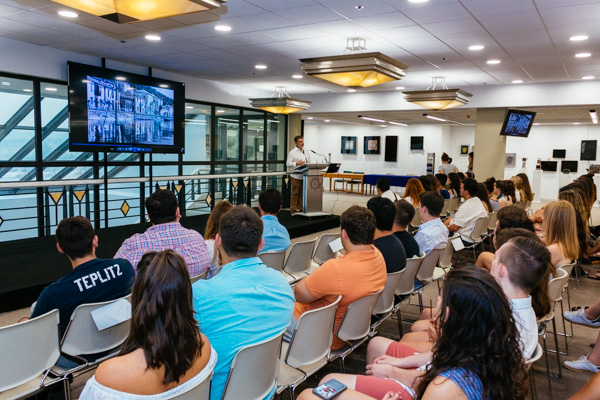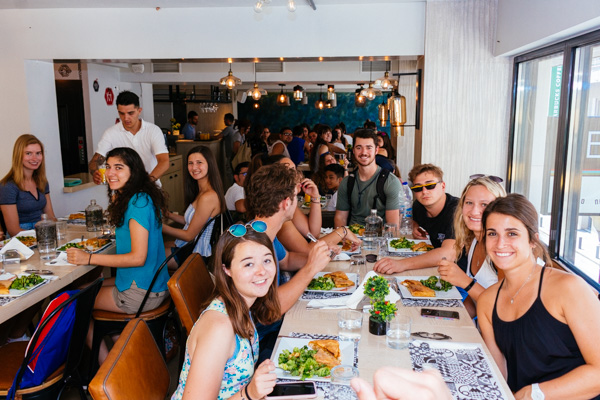From Temple to Temple; Part 1
Today was the day. Participants couldn’t be more excited. It was time to visit two of the most important temples in Attica; the Parthenon and the Temple of Poseidon, at Cape Sounio.
While one group spent the day at the Acropolis, the other didn’t sit idle. They went to see a temple of their own! They travelled to the most southern point of the Athenian peninsula, to the Temple of Poseidon, at Cape Sounio. Check back tomorrow to read about the Cape Sounio experience!
Excitement was all around despite the early start. Talks of history could be heard on the bus as the group travelled through the center of Athens. It’s not every day that you get to go up and personally see the beacon of Democracy. Situated in the center of Athens, the Parthenon is visible from everywhere and offers an amazing 360-degree view of the city. A reminder that no matter how many years may pass, history and progress are tied hand in hand. Kyros Vergados was particularly taken aback. “Each time I have visited the Acropolis I have felt an overwhelming sense of pride for my heritage, knowing that we have created masterpieces such as the Parthenon that have lasted centuries of celebration and turmoil. It is a sight that will never cease to be a symbol of Greek strength, pride, and beauty.”
Fun fact: In Athens, by law, no building is to be built taller than the Parthenon!
Descending from the Acropolis through the archaeological site, the group ended up walking through the picturesque part of Plaka, called Anafiotika. Reminiscent of Greek islands, participants were even more excited about the trip to Andros. Our destination was Deree’s building that houses the Institute of Public health and Institute of Diplomacy & Global Affairs, where the groups had another Greek language class. This time though, they were preparing for the real thing.
Having left the class behind, the group headed to Monastiraki, to Meliartos, where traditional taste meets modern design. The participants practiced their Greek by ordering coffee, to everyone’s delight, and had a delicious lunch consisting of traditional Greek pies.
With bellies full of food, and heads full of fresh knowledge, the participants headed back towards Deree’s campus, to attend a lecture by Dr. Alexander Kitroeff, an Associate Professor at the Department of History, Haverford College, on “What it’s like to be Greek.” He introduced the group to the Benaki family, and their contribution to the preservation of Greek culture through the Benaki Museum. As Greeks of the diaspora themselves, their motives, actions, and love for Greece resonated with the participants.
Dr. Kitroeff then showed the group part of the documentary “The Journey. The Greek American Dream”, which struck very close to home for the participants, as the stories of Greeks leaving for the United States was indeed their own. Talking to the participants afterwards, one could see that each one was affected differently by the discussion and documentary.
Mary Jacobsen passionately said that “the topic of Dr. Kitroeff’s talk about “What it means to be Greek”, filled my heart and brought me to tears. The traditions and values we still follow carry out into our everyday lives, which in turn creates an amazing community. The discussion we had after was brief but very impactful. I couldn’t be happier to be at Heritage Greece connecting with other people my age with similar family heritages.”
The range of emotions in the room was amazing. Harrison Dulgarian was “really touched about Dr.Kitroeff’s explanation of the exhibit on the Armenian Genocide at the Benaki Museum. I am a half Armenian, half Greek American whose family escaped the genocide and fled to America in 1915. It’s our duty to recognize and fight for the Greeks and Armenians who were slaughtered by the young Turks in the Pontiac and Armenian Genocide. […] Dr. Kitroeff said (in regards to the Greek brain-drain) the “best don’t leave, the ones who leave become the best.” My pappou left for America in 1959 with 8 dollars in his pocket. He created a name and a life for both himself, and his family. He has now turned that 8 dollars into financial support for over 50 people in America and Greece.”
Being a scholar of the matter herself, Sophia Keller immediately knew what Dr. Kitroeff was talking about regarding community growth. “I thought Dr. Kitreoff’s presentation and documentary were in agreement with my research in that Greek-Americans thrive when gathered in a community, and that sense of community can be represented by garments and jewelry as well as many other means. Additionally, it made our current trip seem particularly appropriate as we are gathered together in a community, Greeks and Greek-Americans, supporting and uplifting each other.”
For others, such as Michael Taormina and Evan Goodson, the discussion on family, Church and community particularly touched them. “The thing that jumped out at me most was when they were speaking about how it basically runs in the family to make sure that someone’s daughter or son lives a better life then they did,” said Michael. “I think it is so accurate because I feel that my parents did that with me and I would want to do that for my kids.”
On a similar note, Evan commented on how important the local Orthodox Community is. “Being a proud Greek American, from the south, community has always been important to me. The churches are the glue for the παρέα in America, from coffee hour, to GOYA, and summer camps, churches have held together communities for many years now. What stuck out to me the most, was this phrase from the documentary and following discussion.
“When I (parents) die, you will be able to go to the church, and find people like me. You will never be alone.”
This sentence, though simple, carries a lot of weight! When our elders pass on, we will still have the Greek Orthodox Community to guide us and steer us correctly.”
At the end, Dr. Kitreoff said that “it was a great pleasure and an honor to be able to show this DVD, which is about Greek-Americans, to a bunch of Greek-American kids who are visiting Greece and are experiencing pride in Greece, talking about the pride that Greek-Americans have about their culture.”
The inspiring day ended with dinner at a local ταβέρνα (restaurant), with everyone rejoicing in each other’s company.
Join us tomorrow as we explore the Temple of Poseidon at Cape Sounio!
Smile! You’re at the Parthenon.
An amazing blend of traditional cuisine and modern design at Meliartos.

Dr. Kitreoff talks to the participants about what it’s like to be Greek.


Leave a Reply